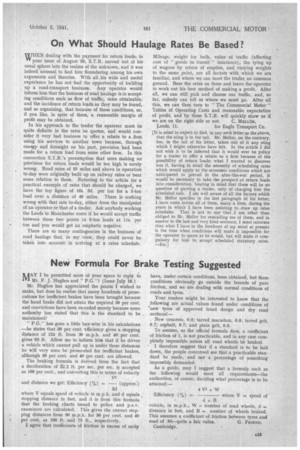On What Should Haulage Rates Be Based ?
Page 25

If you've noticed an error in this article please click here to report it so we can fix it.
WHEN dealing with the payment for return loads, in " your issue of August 29, S.T.R. moved out of his usual sphere into the realms of the unknown, and it was indeed unusual to find him floundering among his own arguments and theories. With all his wide and useful experience he has not -had the opportunity of building up a road-transport business. Any operator. would inform him that the business of road haulage is in accepting conditions such as flow of traffic, rates obtainable, and the incidence of return loads, as they may be found, and so organizing, that because of these conditions, or, if you like, in spite of them, a reasonable margin of profit may be obtained.
In his approach to the trader the operator must be quite definite in the rates he quotes, and would consider it very bad business to offer a rebate to a ,firm using his services to another town because, through energy and foresight on his part, provision, had been made for a return load from some other firm. In this connection S.T.R.'s presumption that rates making no provision for return loads would be too high is surely wrong. Road rates of 25 miles and above in operation to-day were originally built up on railway rates or bear ' some relation to them. Referring to the article for a practical example of rates that should be charged, we
• have the top figure of 16s. 3d. per ton for a 5-ton load over a disance of 40 miles. There is -nothing wrong with that rate •to-day, either from the standpoint of an operator or that of a trader. Ask anybody working the Leeds to Manchester route if he would accept traffic between these two points in 5-ton loads at us, per ton and you would get an emphatic negative. There are so many contingencies in the business of road haulage that, in my view, they could never be taken into account in arriving at a rates schedule.
Mileage, weight for bulk, value of traffic (affecting cost of " goods in transit " insurance), the tying up of wagons by return of empties, and varying weights to the same point, are all factois with which we are familiar, and where we can Meet the trader on common ground. Base the rates on these and leave the operator to work out his best method of making a profit. After all, we can still pick and choose our traffic, and, so far, nobody can tell us where we must go. After all this, we can then turn to "The Commercial Motor" Tables of Operating Costs and reasonable expectation of profit, and by these S.T.R. will quickly show us if we are on the right side or not. C. MELL6R,
Leeds, 11. for Eagle Transport Co.
[It is usual to expect to find, in any such letter as the above, that the sting is in the tail. Mr. Mellor, on the contrary, has, in the tail of his letter, taken out of it any sting which I might otherwise have felt. In the article I did not wish it to be inferred that it would ever be policy for a trader to offer a rebate to a firm because of the possibility of return loads-, what I wanted to discover was if, having in mind the necessity of scheduling rates which would apply to the economic conditions which are anticipated to prevail in the after-the-war period, it would be necessary to take the prospect of return loads into consideration, bearing in mind that these will be no question of quoting a trader, only of charging him the scheduled rate. I am well aware of all the factors which Mr. Mellor specifies in the last paragraph Of his' letter; I have come across all of them, many a time, during the years in which I have been assisting to draw up rates schedules. That is not to say 'that .I am other than obliged 'to Mr. Mellor for reminding me of them, and in answer to the last and very kind sentence, I must reiterate that what I have in the forefront of my mind at present is the time when conditions will make it impossible for ' the operator to quote as he would, but will make it compulsory for him to. accept scheduled statutory rates. —En.]




























































